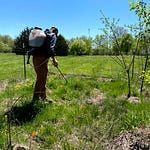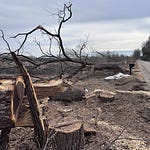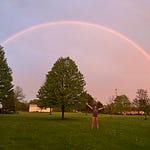This is the newsletter version of Sara by the Season, where I explore what is piquing my curiosity as I try to lean into nature’s wisdom and rhythms. You can listen to me read you the newsletter by hitting play above - or you can click the little link above and to the right to play in your favorite podcast player. If you know someone who would like this sort of thing, I’d be so grateful if you would share it.

I’ve been thinking a lot about this On Being episode with Amanda Ripley, a journalist-turned conflict researcher who has been studying and writing about what she calls “high conflict,” which she defines as, “the invisible hand of our time. It's what happens when discord distills into a good-versus-evil kind of feud, the kind with an us and a them. In this state, the brain behaves differently. We feel increasingly certain of our own superiority and, at the same time, more and more mystified by the other side.” Welp, that sounds familiar.
The whole episode is really worth listening to, but there was this little story about her son that I’ve been thinking about lately. She noticed that, when her son was afraid, it came out as anger. He got mad. And once she noticed it in her son, she realized that was what happened when she got scared too. She got angry. The thing I hate about cable news generally and Fox News in particular is how they’re obsessed with keeping viewers scared (except when it costs them viewers like rational reporting about Covid or gun reform or January 6th).
I wrote about being sick of the rage cycle, but I didn’t think to connect it to what might be underlying all of the latent rage we’re seeing everywhere, especially as we see young people making very innocent mistakes and getting shot for them. When we’re scared, for many of us, anger is what shows up because we’ve been indoctrinated that it’s weak to show that we’re afraid. In most spaces, anger is not only allowed, but often glorified.
I like to make this analogy about difficult emotions when I’m teaching yin: the difficult emotion is like a beach ball that you’re trying to push under the water. It might disappear for a second or two, but then it pops up elsewhere in unexpected ways. When we stuff or numb our difficult emotions, they’re like trying to push the beach ball under the water - it doesn’t go away, it just comes up sideways, usually at very inopportune times. Instead, it’s better to sit with the difficult emotion, get curious about it, see it as a teacher instead of an enemy. Pema says, “Nothing ever goes away until it has taught us what we need to know,” so you might as well deal with it on your terms instead of risking it coming up sideways with all sorts of blowback.
If fear is underneath the anger that we’re stuck in cycles of, then we can’t deal with the anger until we’ve dealt with the fears. There is plenty to be afraid about: we are living in an unbelievably destabilizing time, the pace of change continues to accelerate with little thought to consequences, we seem to be more divided than ever or at least watching the news certainly makes you feel that way, and the climate crisis alone forces me into the fetal position with the covers over my head more times than I’d like to admit.
Ripley says, “In high conflict, any intuitive thing you do to get out of the conflict will almost certainly make things worse. So now I try and I don’t always succeed, to take my first intuition and just ask myself, ‘could I do the opposite? What would that look like?’ Because that’s how you step out of that dance. But it’s very unintuitive.” Our instinctual thing to do when there’s conflict is to get angry, to fight back. I tend to retaliate in my own head (often for hours after the conflict) even if I don’t physically or verbally fight back. Ripley is saying what many of us have experienced firsthand - our initial response when we’re in contentious situations is maybe not the most trustworthy response. That initial flash of anger is valid and good information, but it likely isn’t terribly conducive to resolving the situation at hand.
In another On Being episode, activist Adrienne Maree Brown talked about, when she was organizing for the 2004 presidential campaign, she had this realization that they were putting all their efforts into the presidential campaign:
And I was like, oh, we are trying to just change the top layer of this very layered cake, this very layered process, this system of governance. We think that if we just win the presidency, that then we’ll be able to change the world.
And it clicked for me that it’s like, actually, it’s a fractal system. And it’s layer on top of layer on top of layer. And if none of us are practicing democracy anywhere, it’s not going to just suddenly work at the top layer.
And then I realized — so something about smallness, I was able to gain respect for, because I was like, every single large system or structure or network or political protocol, all of it is made up of small things: of humans either having or not having necessary conversations, and humans being willing to stand up for what is right and stand up against what is wrong. It’s all these small activities that we need to get great at if we want to actually have anything that would be a real democracy.
She goes on to say that we can’t expect democracy to work on a macro scale if we aren’t practicing it in our homes and with our neighbors. In this specific context, she is talking about democracy, but the same is true for the values we want to see more of in the world. We can’t expect them out there if we aren’t practicing them within ourselves and our immediate, closest relationships. Something about the American way of life biases us to what I’ve called “the epic life mentality,” so we are partial to the bigger, grander gestures instead of the smaller, more mundane practices that, Brown argues, are required to effect actual and long lasting change.
I’ve been getting curious about my own instances of anger since listening to Ripley explain the anger-fear connection, and I’ve been getting curious about how anger shows up in our home. It helps me to have more compassion for myself and my family because I’m trying to focus less on the actual anger and more on what might be underneath it. Think if I multiplied that out beyond the walls of my house to get curious about what fears might be underneath the person angrily honking at me at the red light or my coworker who snapped at me in frustration. Think if all of you reading these words chose curiosity instead of anger or retribution - even just occasionally! You can quickly imagine how that would ripple out in our communities.
I don’t think the solution to how divided we are is to just start being more curious about our friends’ and neighbors’ anger. I think there are at least 73 things that we could try - some of them individual and some of them collective. We like to act like there is one solution to our problems, and then fight over the solutions. In fact, our problems are complex and require complex, varied, and many solutions. But I do think A way of building the kind of world we want for ourselves, the generations to come, and the more-than-human world is to choose curiosity whenever we get the chance.
Scattering Seeds
I’m always finding stuff that supports the thesis of the book I’m writing on the benefits of leaning into nature’s wisdom, as well as other things related to this newsletter’s topic that maybe didn’t fit into the actual newsletter, so I thought I could start sharing those links and things here with all of you in hopes of some of the seeds I share germinating into something beautiful at your place.
One of my favorite things written about curiosity, especially pursuing it instead of passion. And follow up with this listen.
Amanda Ripley, when she talks about maybe not trusting that first response when you’re in conflict, is really talking about finding the pause - what Viktor Frankl famously was talking about in Man’s Search for Meaning, his masterpiece about surviving Auschwitz: “Between stimulus and response there is a space. In that space is our power to choose our response. In our response lies our growth and our freedom.” The pause or the space between stimulus and response is also what many of our great wisdom teachers try to teach us. The pause is increasingly difficult to find our over-stimulated, anger-rewarded, trigger-happy culture. In order to - even occasionally! - have access to the pause, we have to be more regulated human beings. For me, good sleep, nature, and movement are the most essential practices to being regulated. Yin, sitting1, good food, and books would be next on my list. Your list is probably different. But before we can access curiosity about our anger - and its underlying fears - we have to practice what regulates us. Katherine Morgan Schafler has some great tips, ideas, and a mantra to steal.
Chris writing beautifully (as always) about the impermanence of spring’s blossoms - and everything, really. “So much comes to us and then leaves again, all in the single season, while other elements linger … then also disappear as summer scorches, fades, and autumn finishes the job. We love it all so hard and it is difficult to not be a little bereft when it leaves, which is okay too so long as we don’t cling so hard to the sorrow that we forget the joy it all brought in the first place.” Read the whole thing.
Via Elise Loehnen’s newsletter comes this anecdote about Carl Rogers, one of the founders of humanistic psychology, from Celeste' Headlee’s Speaking of Race:
The psychologist Carl Rogers suggests reading the following paragraph to yourself before you engage in a fraught discussion with another person:
I’m interested in you as a person, and I think that what you feel is important. I respect your thoughts, and even if I don’t agree with them, I know that they are valid for you. I feel sure that you have a contribution to make. I’m not trying to change you or evaluate you. I just want to understand you. I think you’re worth listening to, and I want you to know that I’m the kind of a person you can talk to.
Rogers’ paragraph before conflict seems like the perfect way to find the pause and to halt the angry retort when we’re in high conflict situations. I’m pretty sure Amanda Ripley would love it!
Here’s to choosing curiosity in the days ahead!
Sara
What I call my meditation practice to keep my brain from going all judgey and critical.













Share this post